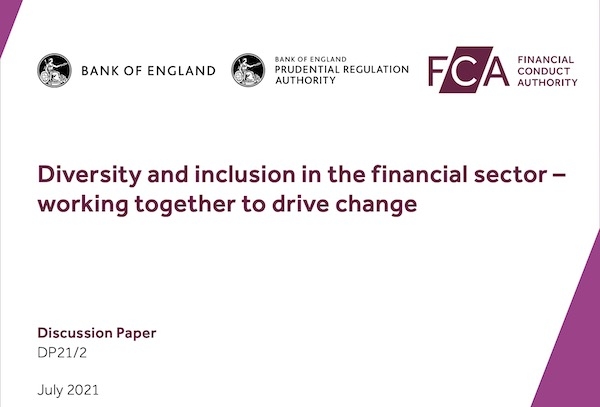
FCA may set diversity targets for regulated firms

The FCA and other regulators may set diversity targets in future for regulated firms.
In a joint Discussion Paper published today - DP21/2: Diversity and inclusion in the financial sector - working together to drive change - the FCA and other regulators said diversity and inclusion in financial services needed to improve.
Potential solutions to the lack of diversity outlined by the regulators could include making senior leaders in regulated firms “directly accountable” for diversity and inclusion in their firms and linking remuneration to diversity and inclusion metrics.
The aim of any changes will to be boost the representation of women, minorities and under-represented groups in regulated firms.
Policy options could include the use of targets for regulated firms to boost representation of minorities.
The regulators, the FCA, PRA and Bank of England, are concerned that women are under-represented in senior roles in financial services and there are concerns that the situation for ethnic minorities is “going into reverse.”
The 2021 Women in Finance Charter Annual Review found that in 2020 there was, on average, only 32% female representation in senior management among charter participants, an increase of less than 1 percentage point year on year from 2017.
In addition, early findings from the Green Park Business Leaders Index (2021) show a decline in the number of black leaders and the ‘black pipeline’ to senior management for FTSE 100 companies. Fewer than 1 in 10 management roles in financial services are held by black, Asian or other minority ethnic people, the FCA said.
There is also limited progress in social mobility. A study of 8 financial firms (including regulators) found that 89% of senior roles were held by people from higher socio-economic backgrounds.
The regulators propose collecting data from firms regularly about their workforce. Prior to this there will be a one-off, pilot survey later this year. The regulators are also asking for views on how any changes could be tailored to specific categories of firms to ensure it is proportionate.
The discussion paper underlines the importance of data and disclosure in order to enable firms, regulators and other stakeholders to monitor progress.
In a statement today, the regulators said: “The regulators believe that increased diversity and inclusion will advance their statutory objectives by resulting in improved governance, decision-making and risk management within firms, a more innovative industry, and products and services better suited to the diverse needs of consumers.”
Nikhil Rathi, chief executive of the FCA said: “We are concerned that lack of diversity and inclusion within firms can weaken the quality of decision-making. We look forward to an open discussion on how we should use our powers to further diversity and inclusion within financial services, to the mutual benefit of firms and their customers.”
To assess progress the regulators are proposing collecting data from firms about their workforce. Prior to this there will be a one-off, pilot survey later this year which will help to develop the proposals set out in the discussion paper and test how firms’ can provide data with a view to considering regular reporting in the future.
The regulators are also asking for views on how any changes could be tailored to specific categories of firms to ensure they are proportionate.
The discussion paper is open until 30 September. Detailed proposals with a joint consultation are planned for Q1 2022.
Matt Connell, director of policy and public affairs of the Personal Finance Society, said: “Since 2019 Chartered firms have had to implement a diversity and inclusion policy. To ensure these policies are delivering positive change, 2021 was the first year the CII requested examples of the impact the approaches are having on Chartered firms when they wish to renew their status.
"We believe the Financial Planning profession should take account of and reflect the interests of all the people it serves, and therefore we look forward to continuing to work with the regulators on this important work.”
